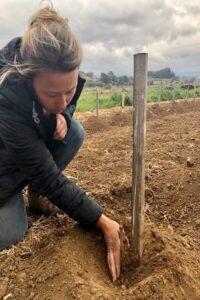
Domaine Les Luquettes
Bandol France
For the wine lovers out there who are considering joining natural wine clubs, we have provided you with some background regarding what the term natural wine means.
The term ‘natural wine’ lacks an exact definition, and opinions on it are plentiful. To clarify, we focus on wines made through natural, organic, biodynamic methods, and sustainable practices, even if they lack official certifications. While some call them natural or organic wine clubs, we prefer the term ‘naturally made’ to encompass our selection in our French and Italian Wine Clubs.
When we say a wine is ‘naturally made,’ we mean it adheres to traditional, minimal intervention methods in both the vineyard and cellar. But what do these certifications entail? Let’s explore these terms, starting with natural wine.
What’s Natural Wine, and What Makes It Natural?
To understand natural wine, we must begin with the concept of terroir, a critical element in naturally made wines. Terroir encompasses a unique combination of factors like plants, animals, soil, climate, and more specific to a location in a given year. It also accounts for vintage variations, which influence the wine’s character.
Isabelle Legeron, a leading figure in the natural wine movement, defines terroir as a complex interplay of these factors. She stresses the importance of not dominating this context with human intervention, preserving the sense of place in the wine.
So, why does human influence matter in terroir? To answer this, we dive into the winemaking process and the question of how wine is made.
How’s Wine Made?
Contrary to common belief, wine production involves a spectrum of human intervention in both the vineyard and winery. Now, let’s focus on natural winemaking.
Natural winemaking involves minimal interference with grapes upon arrival at the winery. Isabelle Legeron’s definition of natural wine is ‘nothing added and nothing taken away,’ with organic farming practices as a baseline. Natural winemakers rely on indigenous yeasts for fermentation, sourced from the vineyard and grape skin. They aim to let nature guide the winemaking process, resulting in a living, vibrant wine. Some minimal filtration and low sulfite doses may be used, but that’s about it.
However, the challenge arises in defining the boundaries of natural wine. Questions arise about sulfite levels and filtration, with varying opinions among producers. So, why isn’t all wine made this way? To answer this, we’ll examine the options available for conventional wine production.
Additives in Wine
Conventional winemaking produces wine commonly found in liquor and grocery stores, and involves additional steps compared to natural wines. These wines often add sulfur dioxide (sulfites), water, acid, and sugar at different stages of the winemaking process. Added sulfites, in particular, can vary widely and affect wine quality during transportation.
Filtration is another gray area, with some producers considering any filtration as disqualifying a wine from the natural category. Others were more lenient. Additionally, various additives are allowed in wines worldwide, including wood powders, tannins, cultured yeasts, gelatin, and more.
Mega Purple, a grape juice concentrate used to deepen color and add sweetness to wines, is a prevalent but often undisclosed additive.
By contrast, natural wines have fewer additives and fewer sulfites, and some wine drinkers believe avoiding traditional wines can prevent headaches.
What About Organic Wines?
EU Organic wines adhere to strict organic winegrowing regulations and have a legal definition, with inspections and documentation requirements and obtain an organic certification. Organic wines are produced using organic grapes in the vineyard, though this may require more frequent treatments and higher costs compared to conventional methods.
 Isabelle Legeron aptly notes that farming organically must come from the heart, as it involves a commitment to nature. At Iola Wines, we prioritize organic and biodynamic wines from top vineyards in France and Italy. Whether you seek an Organic Wine Club or a Natural Wine Club, carefully examine your options, as clarity can be scarce in the world of natural wine. We value integrity and will never label a wine as natural or organic when it clearly isn’t.”
Isabelle Legeron aptly notes that farming organically must come from the heart, as it involves a commitment to nature. At Iola Wines, we prioritize organic and biodynamic wines from top vineyards in France and Italy. Whether you seek an Organic Wine Club or a Natural Wine Club, carefully examine your options, as clarity can be scarce in the world of natural wine. We value integrity and will never label a wine as natural or organic when it clearly isn’t.”
Consider Iola Wine Club your natural wine shop, connecting you with the best women natural wine producers that France and Italy have to offer. Let us take you on a special journey through the world of wine. Come pick up a bottle of natural wine today. You can join our white wine, red wine, sparkling, or connoisseur club anytime and be a part of our natural wine community. We ship anywhere in the United States.




0 Comments